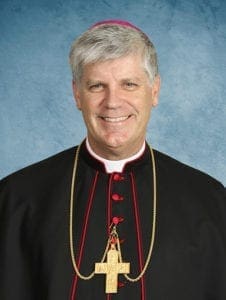Using freedom to serve the good of others
By BISHOP BERNARD E. SHLESINGER III | Published June 9, 2022 | En Español
What might Jesus say to the graduates of today as they embark on a new adventure and the freedom to pursue their dreams? Jesus might offer them a sobering reminder: “Whoever loves his life loses it, and whoever hates his life in this world will preserve it for eternal life.” (Jn 12:25)

Bishop Bernard E. Shlesinger III
The notion of losing a lifestyle in this world can seem daunting to our graduates. Nevertheless, Jesus’ words offer us an understanding of our freedom as a capacity to choose between making ourselves free for the good of others, rather than a freedom from others. Let us look at three aspects of freedom:
First, freedom is founded in truth. Without moral principles to guide them, our graduates may choose to glorify sexual gratification without committed love; they might be tempted to explore the potent power of alcohol and drugs, which can impair their judgment or worse, enslave them in an addiction. The freedom of choice untethered to truth may lead to frustration, anger and a loss of hope. It may lead to the loss of the true joy of loving another person with authentic love. St. Paul wrote about this danger: “For you were called to freedom, brothers. Only do not use your freedom as an opportunity for the flesh, but through love serve one another.” Gal 5:13
Second, freedom is threatened when one’s conscience is not respected. Many young people are indifferent to religion as we see in the rise of the “nones.” Some may feel that organized religion is intolerant of other beliefs and therefore oppressive. We must take these critiques seriously. As a bishop, it is important to me to understand these concerns and to respect the conscience of our young adults. The church’s ministry to young adults can only be credible if it recognizes and respects their subjectivity. However, that freedom of conscience of individuals and even institutions such as the church must also be respected in the public square and in public policy. It is the voice of our young adults that can ensure that these freedoms are protected.
Third, freedom is rooted in love. Jesus tells us to “Love your enemy pray for your persecutor.” When we let resentment and anger take control, we can become subject to a wound that will not heal and festers into bitterness. It is in these instances that we must strive to allow ourselves to be free for love.
As Nelson Mandela wrote after his 27 years in prison: “As I walked out the door toward the gate that would lead to my freedom, I knew if I didn’t leave my bitterness and hatred behind, I’d still be in prison.” We can create our own prisons through anger and bitterness that do not allow us to forgive and to authentically encounter others. It is through this encounter, free of self-interest, that we can come to love others.
What would Jesus say to the graduates of today? “Do not work for food that perishes but for the food that endures for eternal life, which the Son of Man will give you” (Jn 6:27).
It is my hope that the young people of today will choose Christ as their hope and the guarantee of freedom; a freedom rooted in responsibility, truth and love.